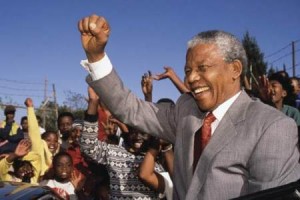In late June 1997 Rabbi Cyril Harris received an important phone call. As the chief rabbi of South Africa, Harris had been an outspoken supporter of the anti-apartheid movement. The phone call was from his long-time friend, Nelson Mandela.
Mandela called to ask Harris to keep an important secret. Mandela was getting married on July 18, his 80th birthday. The date was not yet public. Mandela told Harris he knew that the rabbi could not attend because it was the Jewish Sabbath. So, Mandela asked, would you be available to my home and the week before and give us a special blessing?
Harris later noted this was one of many times in which Mandela displayed tremendous empathy and understanding. What drove this modern-day Moses? How could we withstand decades of imprisonment and emerge with a commitment to forgiveness and reconciliation.
Mandela’s Secret
Mandela’s secret, I believe, is that he knew and lived the truth expressed by philosopher Frederic Nietzche, “He who has a why to live can bear almost any how.”
Mandela had a why. He lived to achieve a free and democratic South Africa. He would do whatever was necessary to achieve it. He suffered. He forgave. He negotiated. He challenged. He did not give up.
A Modern Moses
Mandela was like Moses not only in the way he led his people to freedom. Just as Moses grew up in Pharaoh’s palace, Mandela came from an African royal family. Like Moses, who had to flee Egypt for the wilderness of Midian, Mandela was in exile from his people, imprisoned for 26 years on a remote Island. Like Moses, Mandela also faced internal tensions and struggle over his legacy.
Moses left us with a renewed religion and people. Mandela leaves us with hope and possibility. He leaves us an example of vision and conviction inspiring a people to change the world. His legacy is not esoteric. It is immensely practical and applicable to us all. Here are three examples:
1. Look for the best in everybody: Mandela writes in his autobiography about a vicious prison guard who turned to him as he left and, for the first time, treated him like a human being. The guard said to him, “I just want to wish you people good luck.” Mandela looked for the sincerity and humanity even in those who hurt him.
2. Be generous: As a lawyer, Mandela helped his fellow prisoners—included the white ones who despised him—when he was on Robbin Island. He even helped the prison guards. Mandela knew giving knows no boundaries, and one who gives often receives even more.
3. Forgive: Any student of history know the cycle of violence. One group is persecuted. Then they gain power and inflict horrors on their former persecutors. That cycle threatens Syria at this very moment.
Mandela prevented it in South Africa. He had the vision and influence to create a Truth and Reconciliation Commission that acknowledged the pain of apartheid while preparing a peaceful way forward.
It is one of the most remarkable projects of our time. And his was one of the most remarkable lives of our time. Nelson Mandela gave us insight into the best within ourselves.
May his memory be a blessing.
To Inspire Yourself and Discover More, check out Rabbi Moffic’s free weekly digest of spiritual wisdom


